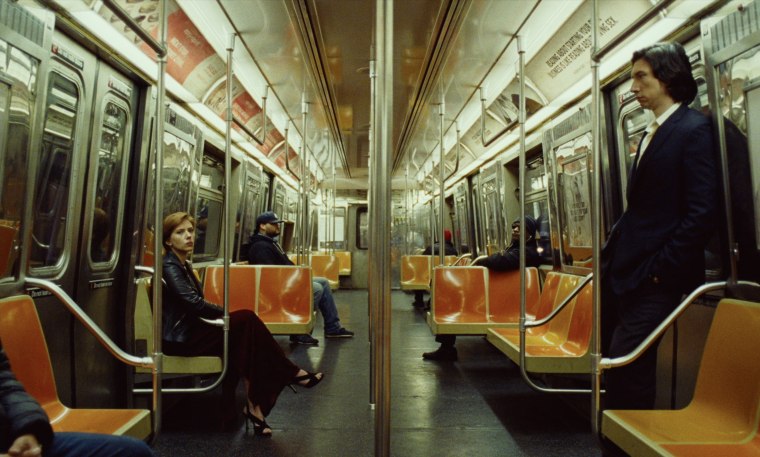Like horror movies, films about love and marriage reflect eras in which we live. Noah Baumbach's "Marriage Story" — which takes some cues from Baumbach’s divorce from Jennifer Jason Leigh, who reportedly gave it her seal of approval — is no different. Starring Scarlett Johansson and Adam Driver as young creatives fighting over the supposed well-being over their child, “Marriage Story” is really about how they see themselves, their futures and even the coasts they’ve chosen to live on; it's a look at how this generation lives, and divorces, these days.
But maybe to understand how and why modern critics have been singing and sobbing its praises since it began the festival circuit in August, it's important to think about where it sits as a movie about divorce, and the people who have them (or don't).
“Kramer vs. Kramer” came out almost 15 years after Betty Friedan’s “The Feminine Mystique” revealed the secret lives of miserable housewives, but it couldn’t have been more relevant to the protagonists' battles over custody, gender roles and each other. Dustin Hoffman and Meryl Streep won Oscars for their portrayals as perfectly imperfect parents fighting for custody over their son; he’s a workaholic who doesn’t notice how miserable his unfulfilled, stay-at-home wife is until she walks out the door on him and their son.
Even today, a female protagonist who leaves her child behind for something as seemingly frivolous as being unhappy would be a hard sell to audiences. When “Kramer vs. Kramer” came out in 1979, the Equal Rights Amendment was going down in ignominy and the religious right was doing its best to tar the feminist movement as anti-woman. It’s not hard to imagine that Ted (Hoffman)’s self-righteous anger toward Joanna (Streep) was a stand-in for most of the audience’s.
Enter, 1989's “War of the Roses,” which focuses on a nouveau rich couple who hate each other so much that they would rather die than relinquish their tony home to the other during their much-needed divorce. Their WASPy upper middle class rage is the epitome of '80s greed, and it can’t be an accident that it stars Michael Douglas, who only two years before uttered “Greed… is good” in “Wall Street.” It wasn’t taken quite as seriously as “Kramer vs. Kramer,” but it’s still an iconic entry in the Divorce Canon, solidly mirroring the ugly divorce fights seen in the 1980s tabloids (if beating the Donald and Ivana Trump one by a year).
The '90s brought us Take Our Daughters To Work Day, The Year of the Woman, and post-divorce narratives epitomized by 1996’s “The First Wives Club,” which stars the iconic Bette Midler, Diane Keaton, and Goldie Hawn as college besties reunited in middle age to get revenge on their scummy exes. It’s no coincidence that these stars are Streep’s contemporaries; by the mid-’90s, women like Joanna Kramer were running the workplace and the government.
The pressures and possibilities of “having it all” was just dawning on us — but as films like “Eat, Pray, Love” (2010) showed us in the decade after "First Wives," perhaps the real lessons begin after divorce.
Which brings us back to "A Marriage Story," because, like anyone who's ever dated a divorcé who hasn't dealt with the divorce, you can't ignore the mechanics of the end of a marriage forever.
Adam Driver’s Charlie is a lanky theater director who identifies heavily with New York and its walkie-talkie low-fi creativity, whereas Johansson’s Nicole is a born-and-raised Californian with the Hollywood pedigree to match. Nicole, who starred in a racy teen movie that is almost certainly a stand-in for Jennifer Jason Leigh’s “Fast Times at Ridgemont High,” was visiting New York when she met Charlie, fell in love and stayed there for him. When Nicole takes a leading role on a TV pilot (Leigh never did), she and their son Henry relocate to Los Angeles; even though their marriage is rocky, Charlie assumes they’ll return when it’s over.
That’s just one of Charlie’s many assumptions that comes back to bite him. Nicole has a rich internal life he's been ignoring, and is basically just waiting for someone to ask her what she really wants. The first person who finally does so, though, is a high-priced divorce lawyer, Nora (Laura Dern). Nicole's and Charlie’s plans for a more elevated uncoupling fall apart as things get uglier and uglier, and reach a climax in Charlie’s shabby rented Los Angeles apartment. It’s only when they totally break down that they can figure out a way to gently build themselves back up, separately and also together, as a new sort of family unit.
In the end, Nicole “wins” — Nora even brags about getting her a slightly larger percentage of custody over their son — but she still seems perturbed that things aren’t actually completely 50-50 with her and Charlie. In the beginning, Nicole loved Charlie more than he loved her back; all along she was just looking for a sort of parity she still doesn't have.
Nicole and Charlie make it through their own “Kramer vs. Kramer” legal showdown and blowout fights like “The War of the Roses,” and at one point Nora is gunning to “get everything” for Nicole as Ivana Trump advised in "The First Wives Club." Plus, Nicole’s steamy car hook-up would make “Eat, Pray, Love” author Elizabeth Gilbert proud.
But “Marriage Story” has its own sort of happy ending — or at least a more hopeful one than the others we’ve seen before. It’s not a split-level house with a mommy and daddy and two children, but that hasn’t been the happy ending most of us get for a very long time now, if it ever really was. Instead, it’s two people who once loved each other one way, trying to be good partners to each other in a new way, for the sake of their child and for their own sanity.


